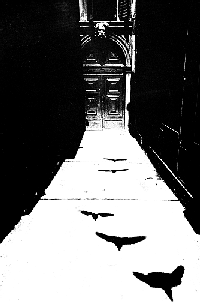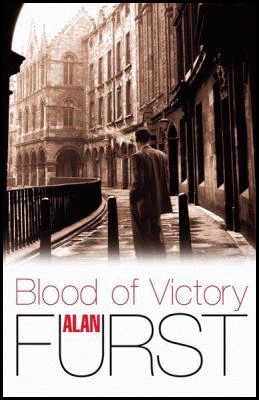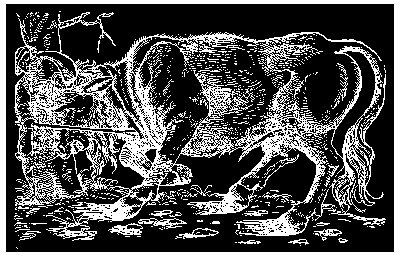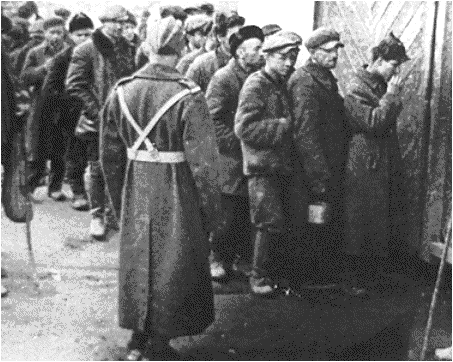--- And a Couple of Stinkers
mysteries do come across our desk from time to time,
mostly and recently, in the form of audio books.
We've found a few that blew our minds
(so to speak) and, as well, a couple of
disgusting, blood-bath drowned-in-gore stinkers.
Here are a dozen-and-a-half that struck our fancy
--- either for better or worse.
Blood of Victory
Alan Furst
(Random House)Furst is a minimalist, a Matisse of words, one who can paint a scene with a tiny golden brush. Serebin finds himself in the office of the official investigating the bombing of his Russian émigré headquarters, which damn near killed him:
The desk of Major Iskandar. Born as conqueror's furniture in the days of the Ottoman Empire, a vast mahogany affair with legs like Corinthian columns and ball feet. But time passes, empires drifted into ruin, coffee cups made rings, neglected cigarettes left burn scars, stacks of dossiers appeared and established a small colony, then grew higher and higher as a hostile world hammered on the national door. Or pick the lock.
Major Iskandar, not very military in a rumpled uniform, had spectacles and a black mustache, with hair and patience thinning as he moved through his forties. He was chinless, with something unhealthy in his complexion, and reminded Serebin of an Armenian poet he'd once known, a great sensualist who died of drinking valerian drops in a sailors' brothel in Rotterdam.
It's that tired bureaucratic office that you and I have been in so many times: the burns, the stains, the pallid officials. But then, here, we get a sudden twist, a mini-drama, cinched in so expertly at the end: the exposition is rolling along like a dream and then poof! A brothel. A sailor's brothel. In Rotterdam. The artist --- dying of an overdose of some wicked herb.
I got caught up in this one about page two, and by page fifty I was rationing myself: we're going to make this one last for a week. But then I blew it. An evening of margaritas, and there it was, on my bed-table, just a peek ... and I threw out the ration card. Serebin and Marie-Galante and I arrive in Bucharest to see if we could get any information on how best to screw up the oil fields of Roumania or --- at least --- somehow plug the Danube, block petroleum being transshipped to the Nazis. Here we are with our fake passports and fake visas and fake traveling papers, at the Tic Tac Club, with, onstage,
the Momo Tsiplet nightclub orchestra, five of them, including the oldest cellist in captivity, as well as a tiny violinist, wings of white hair fluffed out above the ears, Rex the drummer, Hoffy on the clarinet, and Momo himself, a Viennese Hungarian in metallic green dinner jacket.
You think I want to abandon ship right here at the Tic Tac Club, just as the three of us are about to stop the oil that's keeping the entire German war machine rolling, affecting the entire outcome of World War II?
Go to the complete
review§ § § The Bloomsday Dead
Adrian McKinty
(Blackstone Audio)Michael Forsythe is an "eejit," a "piece of shite." All this as he is finally closing in on finding the kidnapped eleven-year-old Siobhan Callaghan somewhere outside Belfast. As he comes into the Orange Lodge, a cottage where three kidnappers are holding the daughter (of the love of his life), he steps on a "cattle grid" and his prosthetic foot jams between the bars, gets yanked off and, no matter how he pulls and pushes, he can't get it out. Since he is about to open the door of the hut and have a gun battle (his sixth or seventh of the day ... we lost count) with the three kidnappers, he opines that he will not get very far with only one working foot.McKinty knows how to grab the reader. At each moment we are ready for his testy hood to go through another session of blood-letting ... and we are not so sure he will survive. By the time he gets to Belfast, Forsythe has already murdered a fellow-worker, thrown a gunman out the window of the Miraflores Hilton in Lima, beaten a cabbie-kidnapper near to death with a tire-iron in Dublin, had a near-death experience himself with a gun-toting hombre in a whore house, then --- once in Belfast --- fought off four or five hoodlums in a pub, shot another in the groin at a downstairs dog-fight saloon, survived a grenade attack on a houseboat, and cornered the head of the IRA in the local library ... only to get kidnapped and spirited away by a Russian thug.
Go to the complete
review§ § §
A Caribbean
Mystery
Agatha Christie
Rosalind Ayers (Reader)
(Audio Partners --- 5 disks)It is nicely plotted: the ten or so characters laid out for us at the very beginning; and, knowing Christie, the least likely will be the one who did it, and the unpleasant ones who seem the most suspicious will gradually fade out. One character --- a crotchety old miser with keen eyes and the knowledge that people are after him for his money --- will turn out to be Marple's fellow detective.These Agatha Christie novels are not, in truth, novels: they are plays with excellent dialogue, spun out patiently, little description (we don't even know what most of the characters look like) until finally, zounds, there is the villain, trapped at the crucial moment, cursing Miss Marple, trying to wrestle his way out the door.
It's lots of fun, and the reading by Rosalind Ayers is more than adequate, but how the grouchy old bachelor gets away with calling Miss Marple a "pussy" ... we'll never know.
Go to the complete
review§ § § Death of a Dreamer
M. C. Beaton
Graeme Malcom (Reader)
(Audio Partners)Lochdubh is a small, scenic town in Scotland. Artist Jock Fleming arrives, charms all the ladies. Until Detective Hamish Macbeth noises it around that the painter has syphilis. One of the ladies, Effie Garrand, is charmed a bit too much. Her body is soon found up the hill, and it's not VD --- it's antifreeze. In a wine bottle.The police say suicide. Macbeth says no. You can guess where he stands in the police hierarchy.
Bill Ott, editor/publisher of ALA/Booklist, recently reviewed Andrea Camilleri's Rounding the Mark. He said that it's "a losing battle against the melancholy that weighs down so many overburdened European cops, from Henning Mankell's Kurt Wallander in Sweden to Michael Dibden's Aurelio Zen in Italy." He might have added Macbeth. For Hamish is not only on the wrong side of official police thinking, he's a worrier, a daffy loser. And, naturally, he loves the wrong women.
One --- a reporter in the city --- keeps drifting away. Macbeth seems blindsided, too. In Death of a Dreamer he almost ends up in bed with a lady who is one of the suspects.
This one starts off well, and the language of Robert Burns, one of our favorite poets, is rendered nicely by reader Graeme Malcolm. We even found out what a "bap" was.
But then Macbeth gets sapped, he figures out who the murderer is, as he puts on the handcuffs on him or her ... I won't tell ... there are screams, insults, curses, and it all ends so neatly that some of us Chandler fans might get restless. We like things left hanging out, and I ain't talkin' the cruder definition of "baps."
They say that Ms. Beaton has churned out twenty Hamish Macbeth detective stories, along with fifteen with a lady detective named Agatha Raisin.
Really! Agatha? Raisin? Hamish? Macbeth?
Has Great Birnam Wood come to high Dunsinane Hill at last?
Go to the complete
review§ § § Tooth and Claw
A Mystery
Nigel McCrery
(Pantheon)In the first hundred pages of this one, a young and beautiful television news reporter gets tied up in her bed and has her arm flayed until she passes out and dies. The butchery is described exactly, with careful attention to detail.Then we go to the coroner's office, where the autopsy of her body is shown in exquisite detail. How they open the chest, how they pull down the skin of her face, how they saw open the skull, how tiny her brain, etc., etc.
Meanwhile, we are told that the investigating detective Mark Lapslie suffers from synæsthesia --- every sound he hears gets transformed into a taste. In the railroad station, the noise of a passing train makes him vomit. The act of barfing (and the barf itself) are described to a fare-thee-well.
Lapslie goes to Braintree to investigate a man who got blown up in the train station. What is left of the exploded commuter is revealed in minute detail,
Everything from the knees up was burned, blasted, and blistered. The skin was crisped in places, and some of the body fat on the chest and arms had melted, slowed and then solidified again in yellow rivulets, like candle wax.
I apologize. That's as far as I got. I figure if I want to get more details about the hacking and sawing and blistering and cutting away of human tissue I could always go back to medical school (and flunk out again). Or turn on the Operation, Flay and Dissection Channel (there has to be one) --- on the internet, get a belly-full.
Oh, I forgot. There are a couple of merry moments. One is where our synæsthesia-challenged detective is hearing a car horn. Tastes like "the sudden stab of salmon and carmel."
This may be the most delicious moment in Tooth and Claw. Then, another taste-treat: during the autopsy, as the coroner pulls the scalp down "like a flap to cover the face from brow to lips with a raw mask of flesh"
and the crunch of gristle and flesh separating made Lapslie's mouth tingle like sparkling wine. Not champagne ... o no: but something sweeter, like Asti Spumante.
Asti Spumante!
I have to tell you that when Lapslie was on his knees, retching, I thought there for a minute that I might have to join him.
Go to the complete
review§ § § Battle Creek
James Sallis
(Walker)At the beginning, we liked the simple no-nonsense style of the book, liked the wise, tired no-nonsense country-cop narrator, Turner.His fellow officer Don Lee had stopped a red Mustang for speeding. They jailed the guy, and searching the car, found "A nylon sports bag in the trunk that held two hundred thousand dollars and change." Great start.
Alas, it's downhill from there on. Car wrecks. Drug deaths. And Turner, turned into a counsellor, working with a prison guard who had been caught up in a riot. They cut off his fingers, a day at a time.
After eight days, one of the inmates got picked off by rifle-fire. As the other prisoners "stood staring at Billy's body in the open door, I came up behind him and gouged out his eyes with my thumbs."
He held up his hands. I saw the ragged stumps of what had been fingers. And the thumbs that remained.
This is one of the best mystery novels to cross our desk in a long time.Seems that this big guy named Murray Grey meets a Ms. Charolais for what looks like fun and games in the country, but turns out to be a "fatal attraction."
At first they cavort with the flowers, but then comes the ominous Mr. Breeder who seems to have other ideas for them. Although she is the original innocent hoofer, Charolais keeps running into dangerous strangers with strange names: The Bloat, Hardware Disease, Footrot, Lump Jaw, and the worst of the bunch --- a foreigner named Calculi. Even though it seems pastoral, it's an animal world out there, especially when Murray Gray is corralled and, ug, castrated by the Elastrotor Ring Gang.
Charolais is beside herself, and in her grief, gives birth to a twenty-five pound male who they immediately name "Red" --- Red Angus, for short.
Well, Red grows up --- rather quickly (800 pounds in a year!) --- and vows vengeance for the indignity visited on Murray Gray. Taking the bull by the horns, he goes after Mr. Breeder, but learns to his amazement that Breeder is his uncle (he finds this out when Big Red steps on his foot, and the old stud yells "Uncle.") Joining forces, they fend off Lump Jaw and Calculi, finally eliminating the entire Elastrotor Ring. The final scene has one of the whole family, riding off, into the sunset, singing "Cow-cow Boogie."
Warning: There is some bull here, but mostly, the Gray family --- and probably you --- will end up contented, with little if any beef about the tail.
§ § §
Nobody Move
A Novel
Denis Johnson
(Farrar, Straus and Giroux)I'd tell you the plot but a plot in a detective story doesn't count for beans. Try to parse Kiss Me Deadly or The Maltese Falcon. Just stay with Nobody Move long enough because it'll suck you in soon enough with the dialogue, people getting shot and getting killed and getting naked which may or may not come to some kind of fruition. You might want to get out before the end, though, before the thing with the colostomy bag.Jimmy Luntz --- who tells some people his name is "Franklin Franklin" --- gets people so riled that they vow several times to cut off his nuts and fry them for lunch and gark eat them too. Luntz is a lousy killer, too nervous, can't aim worth shit. All he wants to do he tells Anita is gamble his nights away and waste his days watching TV and drinking diet Coke.
Anita Desilvera watches him throw a gun in the Feather River ... that's how they meet so they are stuck together for (most of) the rest of the book. An Arab named Juarez is trying to find him so he can murder him. His boss, Gambol, the one he shot in the leg, is the one who suggests the mountain oysters eating routine.
Anita shoots her ex ... they claim she stole 2.3 millions in public funds from the Bakersfield city fathers. When she isn't drinking vodka and soda pop she is teaching Jimmy about love. She also spends some time talking to the river gods. I told you these plot reconstructions don't mean squat.
The cover is a kick --- complete with bullet holes. The dialogue here is a rant (albeit fun) and the outcome gives us a run for our money. A couple of nice touches, too: when someone is trying to strangle you to death, according to Johnson, you'll see colors in sequence, beginning with "a brilliant brown, then a mellow purple, then a beautiful color he'd never seen before in which he had everything he needed and all the time in the world to decide what came next." And when you are preparing to shoot someone with a shotgun, when you take the safety off, it makes a "klick-ack" noise which everybody except me apparently knows. Freeze whenever you hear that.
I got through Nobody Move in a couple of hours because I didn't want to linger over the details, especially when we get to the judge's house (he's the one who framed Anita). He is a dignified, white-haired old geeze, seventy-six, in his wheelchair. Nice clothes too. Anita --- who we had gotten rather fond of --- hits him over the head with his colostomy bag.
To say that that is a little too much to stomach is an understatement: A full colostomy bag across the face! Come on, Johnson!
At that point we lost interest in Anita. And the book. And the author. And any of his future endeavors.
Go to the complete
review§ § § HARK!
Ed McBain
(87th Precinct Mystery)Preposterous?Yes.
Shallow?
Yes.
Flimsy?
Yes.
And yes, a page-turner. I was a bit disgusted with myself for getting hooked on it, but I did.I've read two or three other 87th Precinct mysteries. Engaged while I'm reading, but almost immediately forgetting them. So if you have the taste, this will satisfy, but Ed McBain is no Raymond Chandler, Sara Paretsky or Lawrence Block.
Preposterous? A criminal mastermind not only carefully plans a successful crime, but taunts the police with dozens of anagrams, palindromes and riddles based on Shakespeare's writings.
Shallow? The characters riff on human foibles --- sexual harassment, racism, infidelity, injustice, bad coffee --- but it reads like the evening news: pan to the flames and wreckage; sports after this message.
Flimsy? Sub-plots of middling interest threaten to become more interesting than the story itself. Will the plodding fat racist cop with the Puerto Rican cop girlfriend catch the mastermind's accomplice? Is the geeky white cop with the beautiful black M.D. girlfriend going to destroy the relationship out of jealousy, or is it gone already? Is the brainy whore going to get whacked?
Even the Shakespeare is thin. Google them; quote a few lines. Give us the play title. On to next quote. If Shakespeare were vermouth, we'd have a martini very dry.
What's to like? Well, Ed McBain (Evan Hunter, whose first book was The Blackboard Jungle) has a spare prose style that stays out of the way of the story, like Clint Eastwood's acting style. He keeps the story moving, in bite-size chunks, so if you are bored by one scene, it won't be for long. A mechanical technique, effective with a pedestrian plot.
My advice: if you don't have the 87th Precinct habit, don't start now. If you do, this book will satisfy while you read it. Once you put it down, however, you may wonder why you picked it up.
Go to the complete
review§ § §
The Mystery
Of Cloomber
<Arthur Conan Doyle
(Hesperus)Conan Doyle's language may be arcane, the religious symbols all messed up, but he is a facile writer, and knows how to keep our interest. He is thus wise enough to change narrators in mid-stream: four appear in this brief novel.One of the most charming is Israel Stokes, coachmaster to the haunted Heatherstone. Most of the action of The Mystery of Cloomber occurs in the "Wigtownshire" region of Northwest Scotland, so Stokes speaks in a heavy Scots accent. Stokes is illiterate, and dictates the statement that appears here to Rev. Matthew Clark. But it is wonderfully revelatory, a self-portrait of a sullen lout, who spends much time wondering about (and spying on) his reclusive retired employer.
He reports that Heatherstone is a "lang, thin, dour man wi' grey hair and a face as brown and crinkled as a walnut." When he goes to work at Cloomber, he says that it was "a great muckle house," but that his work was "mair fit for an auld wife than for a grown man."
This style of writing is enough to make the reader grieve that the style known as "dialect writing" has been condemned to an untimely grave by the politically correct literary types. (Indeed, one of our favorite novels of the last years was Buddha Da which may have lost not a few readers because of its musical and fanciful Scots).
Doyle has created a wonderful character, one out of Bobby Burns or Chaucer. In his direct way, when Stokes hears the strange sound that haunts the general, it scares him enough to cause him to give notice. At that point, our fanciful tale suddenly gets grounded in the reality of a peasant cynic, a Falstaffian type who may have many failings, but falsity (about others) is not one of them.
Go to the complete
review§ § § Death of
An Effendi
<Michael Pierce
(Poisoned Pen Press)Cairo 1909. Under British control, Egypt is a simmering stew of international competition against a backdrop of burgeoning nationalist resentment. A wealthy Russian refugee with visionary ideas goes boating with the Mamur Zapt, the head of the secret police ... and winds up dead.Fearful of the secret police no one inquires too closely, except the Mamur Zapt himself, a wily Welshman with an Egyptian girlfriend who knows he didn't shoot the Russian effendi and wonders who did --- and why.
If you like cozy British mysteries but are ready for more exotic climes, Death of an Effendi is for you. The author grew up in the Anglo-Egyptian Sudan and later taught there, and his evocation of the era and the people is believable. The spare prose manages to sketch rather than paint, while the dialog is dry and witty. The comedy of incompetent bureaucrats is a continuing theme, but Pierce never gets far from the murder.
A workmanlike tale of mystery and detection set among the reeds of the ancient Nile.
Go to the complete
review§ § §
Night Soldiers
Alan Furst
Read by
George Guidall
(Recorded Books Unabridged)In other issues of RALPH (and also above) we have reviewed other Furst novels --- Kingdom of Shadows, Blood of Victory, Red Gold. We have spoken highly of them all. Night Soldiers is somewhat different, being not only longer, but the earliest of this series, having been published in 1988. It may be longer than most, but we found ourselves, as we listened to this tape, not wanting it to end.Thus Furst and I have been together now, going to and from work, for ten days, 18-½ hours, 13 cassettes. He tells a dandy story. I mean dandy, but not the walking stick, fancy-dress dandy.
No, this dandy grabs you by the scruff of the neck and won't let go until you, and it, done with each other, are exhausted. I arrive at my job, don't want to leave the car until they blow up the hotel, or until the beat-up old truck of the French partisans can make it down the mountain road, out of the hands of the SS, or until the very unlikely, very American girl meets up with Khristo, wonders about sending a letter home: "Hi, Mom. I'm in Madrid, participating in the Spanish Civil War. Yesterday I machine-
gunned a German Messerschmidt and wounded the fighter pilot. Wish you were here." A Bulgarian tells of what it is like to grow up in the shadow of Russia: "There is an old saying: An elephant can fuck an ant. With enough spit.'" Or from the Turks, "As it is written, so it will be." Or this on the Danube River, a hymn to the history (and the splintering) of Eastern Europe:
This was the Czech Dunaj; it would be the Hungarian Duna in a few miles, then the Dunay in Yugoslavian Serbia, the Dunârea in Romania, then the Dunaj again, in Bulgaria, but it was all the same river, the Danube. He recognized this water, the rhythm of its slow, heavy course, the way it gathered the night's darkness and ran black.
Furst is literate and astonishingly knowledgeable about Central Europe --- its history, customs, music, railroads, ships, hotels, love, language, feuds ... and the ghoulish realities of the WWII period. Indeed, sometimes the cynicism of the writing becomes unbearable: "They were getting ready to die in Bratislava and it had made them very serious..."
And then, weaving through the fabric of these tales like a black thread, there are the spy and terror systems: the Russian NKVD the German SS, the Spanish SIN, the American OSS, the British MI6. After another murder of another Furst character, one I've grown quite fond of, I stop the tape and work on my driving for a bit.But I'm an addict, a forgiving one, so in a while I go back to get mesmerized again, just outside Tarrogona, or in a drunken fest in decadent Paris, or a tiny cell in Santé prison, or on a tugboat on the Danube, in the midst of the retreating Germans, surrounded by the advancing Russians, explosions everywhere, bodies littering the river, and I get home, still don't want to get out of the car because I'll have to turn it off, be forced to wait for awhile to hear the rest of it.
Having read it but never having heard it read aloud, I would never have imagined Night Soldiers could translate into a vocal drama of such power. The reader in this version out of Recorded Books is an actor named George Guidall. All the accents --- at least those that I know (I am a little weak on Russian, Turkish, Bulgarian, Polish, Romanian, and Czech) --- are perfect. The intonation is exact. The dialogue superb. The narrative will knock you off your seat.
Go to the complete
review§ § §
To But Get Up
Off the Floor I puffed peacefully on the cigarette.
I puffed peacefully on the cigarette.He watched me. His face seemed to fluctuate and become vague, to move far off and come back. I felt a tightness in my chest. My mind had slowed to a turtle's gallop.
"What's going on here?" I heard myself mumble.
I put my hands on the arms of the chair and pushed myself up. "Been dumb, haven't I?" I said with the cigarette still in my mouth and me still smoking it. Dumb was hardly the word. Have to coin a new word.
I was out of the chair and my feet were stuck in two barrels of cement. When I spoke my voice seemed to come through cottonwool.
I let go of the arms of the chair and reached for the cigarette. I missed it clean a couple of times, then got my hand around it. It didn't feel like a cigarette. It felt like the hind leg of an elephant. With sharp toenails. They stuck into my hand. I shook my hand and the elephant took his leg away.
A vague but enormously tall figure swung around in front of me and a mule kicked me in the chest. I sat down on the floor.
"A little potassium hydrocyanide," a voice said, over a transatlantic telephone. "Not fatal, not even dangerous. Merely relaxing...."
I started to get up off the floor. You ought to try it sometime. But have someone nail the floor down first. This one looped the loop. After a while it steadied a little. I settled for an angle of 45 degrees. I took hold of myself and started to go somewhere. There was a thing that might have been Napoleon's tomb on the horizon. That was a good enough objective. I started that way. My heart beat fast and thick and I was having trouble opening my lungs. Like being winded after football. You think your breath will never come back. Never, never, never.
Then it wasn't Napoleon's tomb any more. It was a raft on a swell. There was a man on it. I'd seen him somewhere. Nice fellow. We'd got on fine. I started towards him and hit a wall with my shoulder. That spun me around. I started clawing for something to hold on to. There was nothing but the carpet. How did I get down there? No use asking. It's a secret. every time you ask a question they just push the floor in your face. Okay, I started to crawl along the carpet. I was on what formerly had been my hands and knees. No sensation proved it. I crawled towards a dark wooden wall. Or it could have been black marble. Napoleon's tomb again. What did I ever do to Napoleon? What for should he keep shoving his tomb at me?
"Need a drink of water," I said.
I listened for the echo. Nobody said anything. Maybe I didn't say it. Maybe it was just an idea I thought better of. Potassium cyanide. That's a couple of long words to be worrying about when you're crawling through tunnels. Nothing fatal, he said. Okay, this is just fun. What you might call semi-fatal. Phillip Marlowe, 38, a private license operator of shady reputation, was apprehended by police last night while crawling through the Ballona storm drain with a grand piano on his back. Questioned at the University Heights police station Marlowe declared he was taking the piano to the Maharajah of Coot-Berar. Asked why he was wearing spurs Marlowe declared that a client's confidence was sacred. Marlowe is being held for investigation. Chief Hornside said police were not yet ready to say more. Asked if the piano was in tune Chief Hornside declared that he had played the Minute Waltz in thirty-five seconds and so far as he could tell there were no strings in the piano. He intimated that something else was. A complete statement to the press will be made within twelve hours, Chief Hornside said abruptly. Speculation is rife that Marlowe was attempting to dispose of a body.
A face swam towards me out of the darkness . I changed direction and started for the face. But it was too late in the afternoon. The sun was setting. It was getting dark rapidly. There was no face. There was no wall, no desk. Then there was no floor. There was nothing at all.
I wasn't even there.
--- From Little Sister
Raymond Chandler§ § § American Skin
Ken Bruen
(Kate's Mystery Books/
Justin, Charles & Co.)In the first seven pages, we find Glen and the family racing in their old SUV. "The needle was hitting 100 and Karen was screaming." The two children are terrified.They're being chased by Dade who wears "tooled cowboy boots, faded 501s, and a Laker shirt." He is bad news. He has fond memories of being in jail in Miami, "it was the most fun, he got to kick the shit out of a drag queen." The food was good, "hash browns, gravy, grits and mashed potatoes, with pecan pie to follow."
A whore in Philly, whom he'd tried to cheat out of her fee, had come at him with a broken bottle, attempting to gouge his eye out. He'd beaten her to an inch of her life then fucked her again, all the time, the blood pouring from the slash she'd inflicted.
Dade gets the grill of his truck close enough to the back bumper of Glen's SUV to bang into it. A snapshot of Tammy Wynette hangs from Dade's mirror. "He grinned at her, pedal to the metal, having more fun than hunting bear in god's own country."
When the SUV crashes into a tree at 120 mph, Karen "shot through the windshield, hitting the tree with her head, crushing the neck down into the torso." Dade gets out of his truck, sees Karen, says "Hanging out, babe?" He finds Glen still in the driver's seat, says "Glen, how you doing there buddy, day at a time, that's how it goes?"
Shot him twice in the upper chest, dragged him out, leaned over the seat, looking at Ben [Glen and Karen's ten year old son] took the baseball mitt, and put a round in the child's face.
Rosie the four-year-old girl had fallen out the door of the car just before it hit the tree. An old man in a Buick stops to help.
"What happened?"
Dale shrugged, said,
"Shit happened."
Shot him between the eyes, reached in, got the wallet, had a hundred bucks in there.
As Dale leaves in his truck, he's singing. "His voice was low, modulated, almost a hint of sweetness in the tone."
§ § § USA Today praises American Skin's "soulless and depraved characters." Kirkus Review revels in the "flashes of mordant wit." Barnes and USA Today praises American Skin's "soulless and depraved characters." Barnes and Noble refers to "an absolute bloodbath of crime fiction thriller." The Miami Herald finds Ken Bruen "Gloriously entertaining." Publishers Weekly tells of "The banshee of existential agony wailing loud."
Existential agony ... wailing loud ... A Good Samaritan, shot between the eyes. A four-year-old girl, fallen out the door, bouncing off the truck grill. A young mother impaled on a tree. A ten-year-old boy with "a round" in his face. Are we missing something?
Justin, Charles & Co. home page says that it is committed to "books that will engage, entertain, enlighten and delight." It is "based in Boston," we are told, "a long-time hub of American cultural and intellectual life, home to a great diversity of writers, readers, and thinkers of all persuasions." Presumably the likes of Henry Adams, Emerson, Thoreau, the gentle Transcendentalists.
I live too far from this cultural and intellectual hub at 236 Huntington Avenue, where I could, I suppose, drop in to spend a few moments with the editors and publicists at Justin Charles & Co. They would have me figured for another crackpot, so I would have to promise not to take up too much of their time, keep my distance. I wouldn't ask for much: ten minutes or so chatting about our somewhat different views of "to enlighten" and "Existential agony."
And, thank my lucky stars, I live almost half-way across the world from Galway, Ireland. I am sure I could never in a hundred years, especially at my time of life, make it all the way there to visit, in person, with Ken Bruen, to ask about this Existential business, the one I studied in the 1950s, seemingly so different from his own.
In his photograph, the one that comes along with the poop for American Skin, Bruen --- white hair, jutting chin, icy eyes --- looks like a tough customer, might be disinterested in a lecture (even a short one) from some dotty stranger arriving on his doorstep, rattling on about the gentle power of Camus, the holy, non-violent resistance to evil preached by Miguel de Unamuno. He might not tolerate a short speech on simple human virtues offered by so many of the religious masters. Like the vow not to cause harm by deed. Or by word.
Even the written word.
Go to the complete
review§ § §
Don't Look Back
Karin Fossum
(Harcourt)A good detective story is like good pornography. For one thing, it won't leave you alone. This death business spreads out, takes over the world. In the same way in Deep Throat or Tales from the Crack or Bad Wives everyone, no matter how ancillary, gets involved: the milkman, the UPS guy, the maid, the real-estate agent, the chimney-sweep. Sooner or later, they all have their clothes off and are humping away. It's a noisy concert (or consort) of ill-restrained, usually ill-shot, passion.In Don't Look Back --- which, I hasten to add, is smut-free --- Annie Holland is left buck-naked after she gets bumped off out in the lovely Norwegian countryside at the side of a lake near Kollen mountain. Soon after a mysterious figure appears looking at us through windows. Then Annie's step-father commits suicide, an old case (death of an infant) is resuscitated, along with a ten-year-old rape conviction. Then someone beats Annie's boyfriend Halvor to within an inch of his life, and it is revealed that Halvor murdered his drunken, abusive father when he was fourteen. This death business spreads all over the place, like bodily fluids in Debbie Does Dallas and some of us find ourselves caught up in it, becoming a part of it, getting a bit fluid ourselves.
Likewise, in Don't Look Back, we become aides to Konrad Sejer and his young assistant, Jacob Skarre. Every clue that turns up gets us to thinking, well this does point to Annie's old gym teacher, Kurt, doesn't it? After all, he was convicted of rape ten years ago. No, it has to be young Halvor, Annie's ex: he was beaten so regularly by his drunken father that he has a big scar on his face where the old man cut him. He certainly has a hate going, right?
But surely it can't be the elegant rug-merchant Jonas, even though he was the last to see Annie alive. He is so forthcoming. Who could possibly accuse him?
The mystery of a good mystery writer is how he or she leaks out the action and the information in a way to keep us going, and, then, at the end, sews everything up so neatly, in a package, so we are thinking, "Whew!" It is a relief. We have pulled this thing off together, just in time, us (the reader) and Karin Fossum (the writer) and it is like coming to the end of Behind the Green Door; we are relieved to be done with it, but, down deep, there is the wish that we could crank it up, do it all over again.
Go to the complete
review§ § § And Be A Villain
Rex Stout
Read by
Michael Prichard
(Audio Editions)Madeline Fraser runs a daytime interview program on radio. Cyril Orchard --- he puts out a horse-race tip sheet --- appears, talks some, and then topples over dead. Someone has switched the Hi-Spot bottles (they sponsor the show) and a live program gets even more lively as the coroner is called in.The police can't figure out who did it so they make contact with Nero Wolfe. He's an eccentric New York detective who raises eccentric flowers on the top floor of his apartment, eats eccentric foods, and prefers never to go out, especially when he is working on a crime.
This is the first Nero Wolfe mystery I've come across and I certainly intend it to be my last. It's a rotter and I'm guessing that anything else that Stout did will be equally louche ... as is his detective. When Wolfe is questioning the seven suspects in And To Be a Villain, it is just bad dialogue, no different, as far as I can figure, than sitting in on a legal discovery, the lawyers in no hurry, not a whit of diversion, no spark, all just billing time.
Villain is seen through the beady eyes of Wolfe's associate, Archie Goodwin. He might muster a few weak smiles when he tells Wolfe that not only is he fat, but he is conceited. Fat insults are a given --- it was au courant in the 1940s and 1950s --- and, in response, Wolfe grunts which we are also guessing was au courant in the 1940s and 1950s.
Wolfe does a lot of grunting here. He is also stuffed with high-falutin' language: "What you did may have been distasteful, but you did it impeccably," he tells one of the suspects, after a soulful confession. Someone wants him to hide their secret from the police. Instead of giving a simple yes or no, Wolfe grunts, "Manifestly impossible." He also spends a considerable amount of the readers' time staring at the ceiling, reading newspapers, and drinking beer.
Maybe Stout was such a subtle writer that he got a good laugh by creating big bore detective stories for the lumpen and, in the process, making millions. Or maybe he was a big piggy himself.
Speaking of eponymous names, the people who are not to like in Stout's book are Wolfe himself --- obese and arrogant --- and a suspect, an Upper East Side lady by the name of Mrs. Hilda Michaels: "There was too much of her, and the distribution was all wrong," says the ever-cynical Archie.
Her face was so well-padded that there was no telling if there were any bones buried underneath.
Let us not fault Michael Prichard nor Audio Editions. The reading is appropriately dry and American. The pain lies but with the original, because it is the work of a genuine fathead.
Go to the complete
review§ § § The Kalahari
Typing School
For Men
Alexander McCall Smith
Lisette Lecar, Reader
(Recorded Books)Well, somehow, the kids got hold of tape number four, and disappeared with it just after Mma. Makutsi --- Assistant at The No. 1 Ladies' Detective Agency --- had organized the Kalahari Typing School for Men.At the same time, Mma. Ramotswe, head of the detective agency, fiancée to Mr. J. L. B. Matekoni, owner of the Tlokweng Road Speedy Motors, had gone off to seek a family who had suffered a grievous loss of a grand radio some twenty years ago, representing a conscious-stricken man who wanted to make good on his earlier misdeed.
If you think this is just a novel about not-so-
serious goings-on in Botswana, you are probably right. In fact, if I didn't know any better, I would think it was a children's book (ages 12 - 17). Mr. J. L. B. Matekoni is never referred to by any other name than "Mr. J. L. B. Matekoni," and his company is never referred to as "the auto repair shop" but rather, the "Tlokweng Road Speedy Motors." In addition, the story line is nothing but snail-paced, and the characters tend to repeat themselves when they are talking among themselves. Such as Mr. J. L. B. Matekoni telling Mma. Ramotswe "Getting married is different from being able to type. Quite different."
Still, one does get involved in it, and in the oddities that set it apart from, say, Danielle Steele. The characters are mostly rather shy, and they aren't going about beating up on other people, mercy me no. They speak South African English, with a lovely sing-song lilt (and excellent diction, provided by Ms. Lecat --- whose voice and intonation are perfection itself) as they sip their bush tea, and speak of wealth in terms of the cows their fathers owned (or in one case, a large ostrich farm).
I'm on the lookout for tape #4, and I assure you, as soon as it is fished out of one of the kid's tape players, assuming that it hasn't been recorded over by The Pixies or Mars Volta, I look forward to taking this one to its seven-hour conclusion, there among the gentle lives of the gentle folk of South Botswana.
Note: Mr. Smith's newest, The Full Cupboard of Life, has just been released by Recorded Books. Same characters, same leisurely pace. Again, the reader is Lisette Lecat. Booklist gave it a rave review.
Go to the complete
review§ § § The Secret Keeper
Kate Morton
(Brilliance Audio)I had not heard of novelist Kate Morton before she appeared in my mailbox in the form of these seventeen discs from Brilliance Audio. But as I listened to the reading by Caroline Lee, I found myself more and more mesmerized ... by her and her tale unravelling brilliantly. There came a time --- as it should in all good readings --- when you do not want it to keep on keeping on. Furthermore, to prepare this review, I borrowed the book, read through key parts. It got me to mulling on the difference between the written word and the spoken.For one thing, the rhythm and flow of the reading are perfect here, and perfectly paced. Ms. Lee has quite a talent for that, and has a hamper-full of all the right accents. Especially the accents of class which are so important in The Secret Keeper and, as always, in that tight little Island.
Class is as much at the core of this story as is the Blitz. Dorothy (and her love Jimmy) are out of the lower class, trying to rise above their station. Their foil, the astringent Vivien, is upper class, wants everyone --- especially Dorothy --- to know it; seems at one point hell-bent on keeping her in her place.
This class act is important, and as Ms. Lee plays it, she shows, as she speaks, how important the accents are for the plot. Lee can turn old and petulant when she is speaking as noisy Lady Gwendolyn, or for the quiet and aged Dorothy. She turns young and anxious as she speaks for Dorothy, turns elegant as the untouchable Vivian. Finally, Laurel, old and famous, speaks beautifully, as if to the manor born.
If I could do it all over again (I wish I could!) I would seek out the spoken version of this novel. If you do, you may, like me, find yourself bewitched, unable to tear yourself away from it, letting yourself be perfectly transported into another world amd another time, transported on the wings of the oldest of magics: the spoken word. There you'll might yourself entranced by your own place in such a class act: where people would rather die than let the world know where they think they came from, and where they think they're going.
Go to the complete
review











